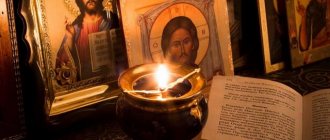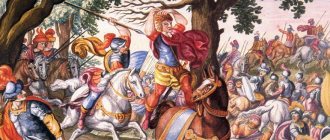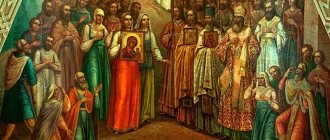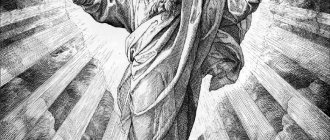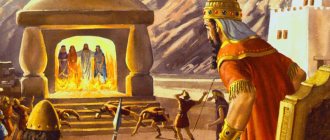Biography of Augustine the Blessed
Augustine the Blessed was born in the Roman outback of Numidia (today it is the territory of Algeria) in the family of a small landowner and idolater Patricius and a Christian Monica. Under the influence of Monica, the husband, shortly before his death, was baptized and converted to Christianity.
Augustine had at least one sibling, but he was the only one who received an education, as parents often had to borrow money to pay for their son's education.
At first he studied in his hometown, then went to Carthage, the greatest city of Roman Africa. Augustine Aurelius received a liberal arts education and taught rhetoric. He began teaching in Carthage and did it at the highest level.
At the same time in Carthage, he wrote his first short philosophical book, which, unfortunately, has not reached us. At the age of 28, the restless and ambitious Augustine left Africa to pursue a career in Rome. He taught there for a short time, as he was soon appointed as professor of rhetoric in Milan, which at that time was the residence of the emperor and the de facto capital of the Western Roman Empire.
He was fond of the works of Hortensius and Cicero, and was also a supporter of Manichaeism, a religious doctrine based on a specific understanding of the Bible. Lost interest in this teaching after a meeting with its spiritual leader, who could not answer his questions regarding certain areas of understanding the Bible and God.
Soon Augustine Aurelius became interested in Neoplatonism and especially the idea of God as an immaterial transcendental Being. Interest in theology was also fueled by the fact that in the course of analyzing the rhetorical aspects of various sermons, and in particular the sermons of Bishop Ambrose of Milan, Augustine became imbued with Christian doctrine.
The key point that persuaded Augustine to accept the Christian Faith was his acquaintance with the Epistle of the Apostle Paul to the Romans.
In 387, at the age of thirty-two, Augustine Aurelius was baptized at the hands of Ambrose, thereby joining his mother's religion.
Augustine's career in Milan, however, did not work out. The collapse of Augustine Aurelius's career in Milan was associated with the strengthening of his religiosity. All his works from that time on were imbued with Christian ideas. After 2 years, he left his teaching position in Milan and returned to his hometown with his wife and son. Soon his wife left him for a lower-class lover. Some time later, his teenage son died. The departure of his wife and the death of his son devastated him, and so Augustine, at the age of 36, went as a junior priest in the Maritime city of Hippo. Hippo was a trading city, poor and uncultured. He soon founded a monastic community in Hippo, where he was bishop for the next thirty-five years. Over time, the small monastery grew into a respected theological seminary.
Augustine the Blessed polemicized a lot with Manichaeism, as well as with Donatism and Pelagianism. He often participated in public debates in which he defended Christian canons. The years of life of Augustine the Blessed after his adoption of Christianity are considered a model of Christian service .
In Orthodoxy, Augustine Aurelius is recognized as blessed , in Catholicism - as a saint and Teacher of the Church .
Saint Augustine Philippe de Champagne
Augustine the Blessed is considered the author of the charter that guides some monastic orders of the Catholic Church. Eg,
- Order of Observant Canons (Augustinian Canons)
- Order of Hermits of St. Augustine (Augustinian Brothers)
- Assumptionists
- Augustinian women's monastic congregations.
His books were widely distributed throughout the Mediterranean. Despite his fame, Augustine died in poverty. However, his lifetime habit of cataloging and categorizing his books has led to the fact that almost all of his legacy has survived to this day.
Read online “On Free Will”
Chapter I
1. Evodius. So, explain to me, if possible, why God gave man free will, for if man had not received it, he, in any case, could not sin.
Augustine. In this case, do you know for certain that what you do not think should be given was given to man by God?
Evodius. As far as I think I understood from the previous book, we have free will and commit sins only thanks to it.
Augustine. I will also remind you that this has already become obvious to us. But now I asked if you knew that what we obviously possess and thanks to which we sin was given to us by God.
Evodius. I think no one else. After all, we ourselves received existence from Him, and by committing offenses and acting appropriately, we receive both punishment and reward from Him.
Augustine. I also want to ask you whether you know this definitely or, under the influence of authority, willingly believe even in the unknown.
Evodius. I confirm that in this matter I primarily trusted authority. But what is more similar to the truth than the point of view that all good is from God, and all justice is good, and the punishment for those who err and the reward for those who do right are just? From which it follows that God punishes those who commit sins with misfortune, and rewards those who do the right thing with happiness.
2. Augustine. I don't mind. But I ask another question: how do you know that we come from God? After all, you still haven’t explained this, but only that we receive either punishment or reward from Him.
Evodius. I find that this is also obvious only because it has already been established: God punishes sins, since all justice comes from Him. For just as it is not the nature of any kindness to provide benefits to those who are strangers to it, so it is not the nature of justice to punish those who are strangers to it. From here it is obvious that we have a relationship with Him, because He is not only extremely merciful when providing benefits, but also extremely fair when punishing.
. Then, from what I assumed and what you agreed with - that all good comes from God - it can be understood that man also comes from God. After all, a person, to the extent that he is a person, is a certain good, since he can live righteously whenever he wants.
3. Augustine. If so, it is clear that the issue you proposed is resolved. If, in fact, a person is a certain good and cannot do the right thing unless he wants to, he must have free will, without which he cannot do the right thing. But just because sins are also committed thanks to it, of course, one should not assume that God gave it for this purpose. Therefore, since without it a person cannot live righteously, this is a sufficient reason why it should be granted. And that it was given for this purpose can also be understood from the fact that if anyone uses it to commit sins, he is punished from above. That it would be unfair if free will were given not only to live righteously, but also to sin. For how would it be fair to punish one who used the will for the purpose for which it was given? Now, when God punishes a sinner, what do you think He is saying other than: “Why didn’t you use your free will for the purpose for which it was given, that is, for righteous behavior”? - Further, since justice itself is intended to condemn sins and honor righteous deeds, it would be good if a person were deprived of freedom of expression. After all, what was not done voluntarily would be neither a sin nor a righteous act. Therefore, both punishment and reward would be unfair if a person did not have free will. However, there must be justice in both punishment and reward, since this is one of the benefits that comes from God. Thus, God had to give man free will.
Chapter II
4. Evodius. However, I agree that God gave it. But don’t you think, pray tell, if it is given for righteous behavior, it should not allow the possibility of turning towards committing sins, just like justice itself, which is given to a person for a worthy life? Can anyone really live viciously because of his inherent justice? Thus, no one could voluntarily sin if the will was given for righteous behavior.
Augustine. I hope God will grant me the strength to answer you, or rather, so that you answer yourself in accordance with that very truth that convinces you from within, which is the highest teacher of all. But I want you to briefly answer me whether you consider what I asked you about - that God gave us free will - as definite and known, or should it be said that what we recognize as given by God is not should have been given. For if it is not determined whether He gave us free will, we rightly ask whether it was given for good, since when we discover that it was given for good, it will also be established that He gave it to man by whom all the benefits; if, however, we discovered that it was not given for good, we would understand that it was not given by the One Whom it is a sin to blame. If, however, it is truly determined that God Himself gave it, we must admit that, no matter how it was given, it could not not have been given, nor could it have been given in any other way than it was...
Works of Augustine the Blessed.
The works of Augustine the Blessed are distinguished by the concentration of ideas. Even if only one of his works had reached our time, we would still consider him the greatest Christian theologian. Moreover, almost all of his works have reached us. And this is more than five million words. Augustine the Blessed was a true master of words. His texts have a rare power - they attracted and inspired his contemporaries, but they have no less influence on us.
His theological style is second only to the Bible itself in terms of imagery. His works are still highly relevant today. He had a unique gift for writing both at a high theoretical level for the most demanding readers, and for creating fiery sermons for less sophisticated readers.
The literary and theological heritage of St. Augustine is great. It includes at least 224 letters, about 500 sermons, pre-Christian and Christian works. The most famous include the following works of Augustine the Blessed.
- Confession,
- About the city of God,
- Against academics (skeptics),
- About the blessed life,
- About order,
- Monologues,
- About the immortality of the soul,
- About the quantity of the soul
- About the teacher
- About music
- About true religion,
- About the benefits of faith,
- About free will
- Against Faustus,
- About spirit and letter.
The most significant works of Augustine the Blessed are “Confessions” (about 400) and “On the City of God” (about 413-426).
Philosophy and teachings of St. Augustine
If we analyze the philosophical positions of Augustine the Blessed, we can characterize him as a creator who adapted the philosophical traditions of the Latin world that existed at that time to the Christian ideas that appeared not so long ago. He created a synthesis of the Christian, Roman and Platonic traditions, thereby determining the further development of the entire European philosophical tradition.
The ideas of Augustine the Blessed had a very significant influence on the formation of the Christian theological canon. The authority of his personality in matters of theology and philosophy was total - right up to the Thomist paradigm. The tradition of Augustinianism within the framework of medieval scholasticism largely determined the philosophical development of Europe for many centuries. Thus, Augustine the Blessed is one of the founders of dogmatic theology .
Let us give one example to support this argument.
In his treatise “On the Trinity,” written in 399-419, Augustine the Blessed sets out the texts of Holy Scripture on the basis of which the Nicene Creed was constituted. St. Augustine's interpretation of the problem of the Trinity is as follows:
The relationship between the Divine hypostases (the essence of the Trinity) is based on the immanent internal dialogue of self-contemplation and self-knowledge, communication and love. The essence of God is realized in the process of this dialogue.
This interpretation of the Trinity gave rise to the development of the emotional and psychological component of Christianity. For philosophy, this became the birth of the traditions of immanentism and dialogism.
The most important point in the teachings of St. Augustine is also the concept of the relationship between faith and rational knowledge . Faith, according to St. Augustine, is
the original basis of any knowledge.
In support of this concept, Augustine says:
“...would a teacher try to explain the dark places in Virgil if he did not first believe in the significance of Virgil. In the same way, the reader of the Holy Scriptures must believe in their authority before learning to understand them.”
Based on Biblical Claim
“Unless you believe, you will not understand” (THE BOOK OF THE PROPHET ISAIAH, chapter 7)
St. Augustine gives as a basis for this the presumption “I believe in order to understand . This idea became the program canon of Christian orthodoxy in relation to the problem of the relationship between faith and rational criticism.
The polemical works of Augustine Aurelius the Blessed, created as a criticism of Manichaeism and Pelagianism, are a huge step in the development of the Christian exegetical tradition , since the polemic comes down to the interpretation of fragments of the Bible.
Augustine's treatise “On the Book of Genesis Verbatim,” written in 401-414, is considered a masterpiece of exegetical literature. The treatise “On Christian Doctrine” can be considered as a guide to the interpretation of the Bible.
In his interpretation of the very nature of philosophical knowledge, Augustine the Blessed worked in line with the Roman tradition of the “applied” approach to philosophy. Augustine the Blessed creates a conceptual model of the universe, the basis of which is the doctrine of God as “perfect Being.”
An important point in the philosophy of Augustine the Blessed is the idea of the possibility of deducing the existence of God as absolute from the self-certainty of human thinking. Augustine the Blessed establishes the idea of “potencies” originally created by God, which at the “appropriate time” acquire the status of real existence, i.e. “seed logos” as a kind of fertilizing meanings. This approach anticipates modern philosophy.
PHILOSOPHY: St. Augustine on freedom and divine predestination
39. St. Augustine on freedom and divine predestinationAugustine's doctrine of divine grace in its relation to the human will and of divine predestination had a great influence on subsequent Christian philosophy. The essence of this teaching is as follows. Before the Fall, the first people had free will: they could not sin. But Adam and Eve misused this freedom and lost it after the Fall. Now they could no longer help but sin. After the atoning sacrifice of Jesus Christ, those chosen by God can no longer sin. From time immemorial, the Divine has predestined some people to good, salvation and bliss, and others to evil, destruction and torment. Without divine predestined grace, man cannot have good will.
Augustine said that without knowledge of truth, “probable” knowledge is impossible, since probable is something plausible, that is, similar to the truth. And to know what resembles the truth, you need to know the truth itself. According to Augustine, the most reliable knowledge is a person’s knowledge of his own being and consciousness: “Whoever is aware that he doubts, recognizes it as some truth...” “Whoever doubts that he lives, remembers, understands, desires , thinks, knows, judges? And even if he doubts, then still... he remembers why he doubts, realizes that he doubts, wants certainty, thinks, knows that he does not know, thinks that he should not rashly agree.” Knowledge, according to Augustine, is based on inner feeling, sensation and reason. A person, says Augustine, has knowledge of objects accessible to understanding and reason, although small, but completely reliable, and the one who thinks that feelings should not be trusted is pitifully deceived. The norm of knowledge is truth. Unchangeable, eternal truth, according to Augustine, is the source of all truths, there is God. What was new in the theory of knowledge was Augustine’s statement about the participation of the will in all acts of knowledge. Describing the role of the volitional principle in feelings, Augustine uttered an aphorism: “A person experiences suffering exactly as much as he succumbs to it.” > > PHILOSOPHY: basic philosophy: briefly: 1. The emergence of philosophy and the formation of its subject 2. The subject of philosophy 3. The main functions of philosophy 4. Philosophy as worldview knowledge 5. Worldview as a philosophical concept 6. Forms of worldview 7. The main question of philosophy: being and consciousness 8. The ontological side of the main question of philosophy 9. The epistemological side of the main question of philosophy 10. Mythology as the initial form of worldview 11. The main philosophical teachings of Ancient India 12. Development trends and the main problems of philosophical thought in China 13. Worldview and culture of antiquity 14. Milesian school : Thales 15. Milesian school: Anaximander 16. Milesian school: Anaximenes 17. Pythagoras and his school 18. Heraclitus of Ephesus 19. Xenophanes and the Eleates 20. Eleatic school: Parmenides 21. Eleatic school: Zeno and the birth of dialectics 22. Melissus of Samos and systematization ideas of the Eleatics 23. Empedocles' contribution to ancient science and philosophy 24. Ancient Greek scientist Anaxagoras 25. Ancient atomism: Leucippus, Democritus 26. Democritus' doctrine of life and soul 27. The emergence of sophistry 28. Sophists: Protagoras, Gorgias and Prodicus 29. Philosophy of Socrates 30 Plato's teaching on being, soul and knowledge 31. Plato's teaching on the state 32. Teachings of the Socratic schools 33. Philosophy and scientific activity of Aristotle 34. Aristotle's teaching on being 35. Philosophy of Stoicism 36. Philosophy of Seneca 37. Stoicism of Marcus Aurelius 38. St. Augustine . The doctrine of being 39. Blessed Augustine on freedom and divine predestination 40. Blessed Augustine on God, the world and man 41. Central Asian philosophy of the Middle Ages: Avicenna 42. Arab and Jewish philosophy of the Middle Ages: Averroes, Maimonides 43. Medieval European philosophy: Thomas Aquinas 44. Thomas Aquinas's ideas about the soul and knowledge 45. Thomas Aquinas's ideas about ethics, society and the state 46. The dispute between nominalists and realists in the philosophy of the Middle Ages 47. Late Middle Ages: Roger Bacon 48. Late Middle Ages: John Duns Scotus 49. Late Middle Ages: the rise of nominalism 50. Theocentrism of medieval philosophy. Patristics and scholasticism 51. Anthropocentrism of the Renaissance 52. The formation of modern science 53. Francis Bacon - the founder of empiricism 54. The philosophy of J. Locke 55. Empiricism of J. Berkeley 56. Rene Descartes - the founder of rationalism 57. Monadology of G. W. Leibniz 58. French materialism: D. Diderot 59. French materialism: P. G. D. Holbach 60. Philosophy of the 18th–19th centuries: Enlightenment and Romanticism 61. German classical philosophy of the 18th–19th centuries 62. Immanuel Kant’s theory of the objectivity of knowledge 63. Theory knowledge of I. Kant 64. I. G. Fichte. Overcoming Kantian dualism 65. Philosophy of F. Schelling 66. Absolute idealism of G. Hegel 67. Dialectics of Hegel 68. Anthropological materialism of Feuerbach 69. Philosophy of Marx and Engels. The final stage of German philosophy 70. Postclassical philosophy of the 19th–20th centuries 71. Philosophy of A. Schopenhauer 72. Philosophy of S. Kierkegaard 73. Philosophy of F. Nietzsche 74. Positivism of O. Comte 75. Philosophy of pragmatism: C. Peirce 76. Philosophical anthropology M. Scheler 77. Philosophy of Western existentialism 78. Philosophy of M. Heidegger 79. Existentialism of K. Jaspers 80. Features of the development of Russian philosophy 81. Ideas of Western European philosophy in the Russian application 82. Explanation of the direction of philosophical and social theories 83. Areas of philosophical interests of Russian enlighteners of the 18th century 84 Westerners and Slavophiles 85. Philosophy of V. S. Solovyov 86. Russian philosophy of the 20th century 87. Philosophy of L. Shestov 88. Philosophy of N. A. Berdyaev 89. Russian cosmists 90. V. I. Lenin - representative of Marxism 91. Philosophy of neopositivism 92. Postmodern philosophy of the 20th century 93. The concept of being. Basic forms of being 94. Philosophical understanding of space and time 95. Consciousness as a philosophical problem 96. The question of the origin of consciousness 97. Basic approaches to the problem of consciousness 98. Structure of consciousness 99. Consciousness and the unconscious 100. Basic approaches to the problem of cognition 101. Human cognition 102 Structure and forms of knowledge 103. Features of everyday and scientific knowledge 104. Philosophy of scientific knowledge 105. Practice and its functions in the process of knowledge 106. Basic philosophical problems of human communication 107. Society and its structure 108. The concept of human society 109. Class approach to social sphere of human society 110. Stratification approach to the social sphere of society 111. The state as a form of public power 112. National state of the modern type 113. Social control in the modern state 114. Moral philosophy 115. The role and prospects of information processes in society 116. The concept of progress in society 117. Historical forms of relations between man and nature 118. The problem of “man - nature” in the conditions of scientific and technological revolution 119. Society and nature: on the verge of disaster 120. Forecasting the future

